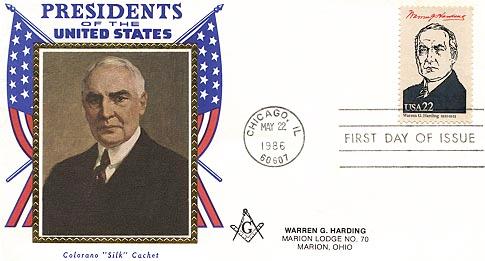Warren G.
Harding
29th
President of the United States

Warren G. Harding was born in
Corsica, Ohio, on November 2, 1865, He attended Ohio Central College, studied
law, and became editor and publisher of the Marion Star, a country newspaper
in Marion, Ohio. He married Florence Kling DeWolfe in 1891, who was considered
a major force in his rise to national prominence. Harding entered politics as
a dependent of Republican Senator Joseph Foraker and served in the Ohio Senate
and as lieutenant governor of the state. He was elected to the U.S. Senate in
1914 but resigned from it in 1920 after winning a landslide election over
Woodrow Wilson as the Republican candidate for president. At the time of his
nomination, and for years afterward, he was widely regarded as having been the
choice of the party machine bosses, but a more recent study has shown that
Harding simply was the party's most logical and available nominee.
Harding turned away from the powerful executive leadership styles of Theodore
Roosevelt and Woodrow Wilson. As president, he delegated much authority to his
cabinet chiefs, whom he chose for their national or regional constituencies or
their weight in party councils. Among the outstanding members of his cabinet
were Secretary of Commerce Herbert Hoover, Secretary of State Charles Evans
Hughes, and Secretary of Agriculture Henry C. Wallace.
Harding's first task as president was to move the government away from wartime
emergency conditions, and in this his administration was successful. In
certain areas it was innovative, stepping up federal hiring during an
employment slump, proposing agricultural legislation, and creating a Bureau of
the Budget. In 1922 Secretary of State Hughes, with Harding's active support,
scored a diplomatic triumph at the Washington Conference on naval disarmament,
when the great international powers had agreed to limit their capital ship
tonnage in fixed ratios. Harding also acted forcefully in the movement to
limit the long hours of labor that were existent in the American steel
industry.
On August 2, 1923, as rumors began to circulate about corruption in his
administration, Harding died in San Francisco. He was succeeded by vice
president Calvin Coolidge. Charges of misconduct in the Interior and Navy
departments, the Veterans' Bureau, the Justice Department, and the Office of
the Alien Property Custodian were disclosed in a series of investigations and
trials. The scandals implicated both high officials and personal friends of
Harding. Discovery of bribery, influence peddling, and outright theft
overshadowed the positive achievements of the Harding administration. The
president had spoken all too truly when he remarked that he could take care of
his enemies but that he did not know how to cope with his friends.

